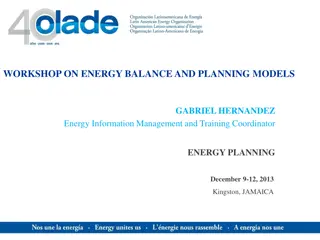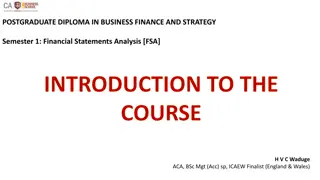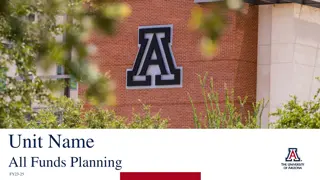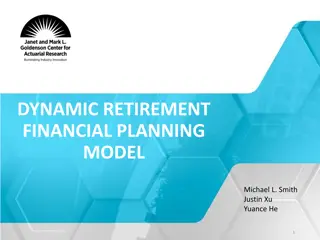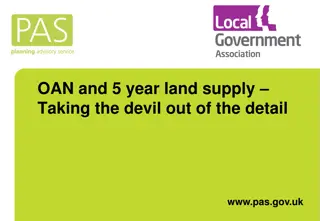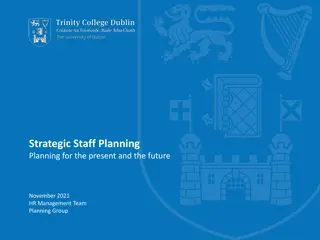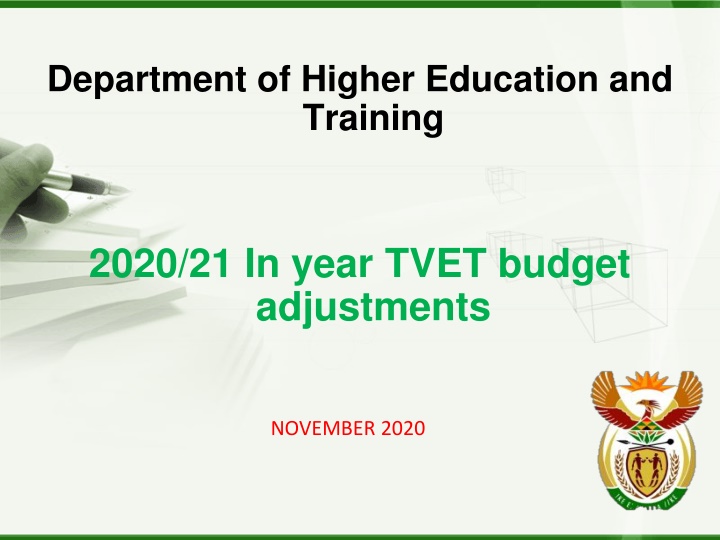
Higher Education and Training TVET Budget Adjustments 2020/21 Overview
Explore the detailed adjustments made to the TVET budget for the 2020/21 fiscal year, including revised budgets, COVID-19 allocations, reductions, and expected future adjustments. The Department of Higher Education and Training is awaiting formal budget allocations for 2021/22, with insights into funding grid processes and allocations. Additionally, learn about the Directive on Allocation for Missing Middle Students and the conditions attached to CIEG funds. Stay informed on the latest developments impacting TVET colleges and funding.
Download Presentation

Please find below an Image/Link to download the presentation.
The content on the website is provided AS IS for your information and personal use only. It may not be sold, licensed, or shared on other websites without obtaining consent from the author. If you encounter any issues during the download, it is possible that the publisher has removed the file from their server.
You are allowed to download the files provided on this website for personal or commercial use, subject to the condition that they are used lawfully. All files are the property of their respective owners.
The content on the website is provided AS IS for your information and personal use only. It may not be sold, licensed, or shared on other websites without obtaining consent from the author.
E N D
Presentation Transcript
Department of Higher Education and Training 2020/21 In year TVET budget adjustments NOVEMBER 2020
2020/21 TVET Budget adjustments Revised budget (before COVID 19 allocation) Additional COVID 19 Allocations Original 2020/21 budget % Budget reduction Final 2020/21 TVET Budgets Net reduction Summary TVET CoE 6,747,952,000 6,398,046,000 -5.19% 6,398,046,000 -5.19% TVET Subsidies 4,768,111,000 4,455,908,000 -6.55% 162,203,000 4,618,111,000 -3.15% NSFAS 2,782,709,000 2,782,709,000 0.00% 2,782,709,000 0.00% Opex new campuses 309,120,000 294,120,000 -4.85% 10,000,000 304,120,000 -1.62% CIEG 959,218,000 392,812,000 -59.05% 392,812,000 -59.05% Total TVET Budget 15,567,110,000 14,323,595,000 -7.99% 172,203,000 14,495,798,000 -6.88% 2
2020/21 TVET Budget adjustments DHET is still awaiting formal budget allocations from National Treasury for 2021/22 Expected end of November 2020 The 2021 Funding Grid process was conducted on draft allocations Final adjustments will have to be made when final allocations have been received The 2021 FG had a (4.8%) adjustment from the final 2020/21 baseline, and a (11.38%) reduction from the original 2020/21baseline. Based on expected trends, a 10% reduction from the final 2020/21 baseline is expected, thus the budgets might still be cut by another (5.2%) But awaiting final allocations from NT 2021 FG: DHET 80% Programme funding for NCV, Report 191 and PLP 13,794,442,044 PERSAL 6,105,592,000 Direct Transfers 4,723,681,494 DHET Programme Funding for SNE 152,044,767 NSFAS Bursary Allocation for Tuition 2,813,123,783 3
Directive on Allocation for Missing middle Students In 2016, the Minister of Higher Education and Training announced that Universities and TVET Colleges student fee increases for 2017 will be funded by the state to a maximum of 8% fee increase. The Department subsequently received an additional funding of R204 million allocation from NSF in order to subsidise TVET Colleges for the fee adjustment. In 2018 academic year the TVET Colleges were informed to utilise the remaining 2017 balances to subsidise the fee adjustments in 2018 for the poor and the missing middle students to a maximum of 8%. However, the remaining allocation of the 2018 academic year was not all spent by some TVET Colleges. As a result the Chief Directorate Financial Planning is currently obtaining DDG approval for TVET Colleges utilise the remaining balance of the allocation to fund the fee adjustment for the poor and missing middle students for the 2019 academic year to a maximum of 8% and subsequent years until the funds are depleted. 4
CONDITIONS ATTACHED TO CIEG Funds must be deposited by the college in a dedicated interest bearing CIEG account within three (3) days of receipt of the funds from the Department; Funds are exclusively provided for maintenance and repairs of core teaching and learning facilities and may not be used for anything other than the intended purpose; The colleges must report on a quarterly basis on the grant expenditure by the 15th day of the month subsequent to the end of the quarter; The Department approved the spending of funds in a form of work packages aligned to the approved maintenance plan; Any irregular expenditure incurred by the college with regards to the CIEG allocation, will be recouped by the Department through withholding of future allocations either from the CIEG tranches of TVET College subsidy allocation, based on the discretion of the Department; 5
CONDITIONS ATTACHED TO CIEG Any irregular expenditure incurred by the college with regards to the CIEG allocation, will be recouped by the Department through withholding of future allocations either from the CIEG tranches of TVET College subsidy allocation, based on the discretion of the Department; Any unspent funds must be returned to the Department, of which the detailed process will be communicated by the Chief Directorate: Financial Planning; and The college may appoint a person with a qualification in construction at an Assistant Director level 09 plus 37% in lieu of benefits for the period not exceeding 3 years who must be employed by the College Council and paid from the grant allocation to manage the college infrastructure project. Colleges are reminded to adhere to section 38 (1) (J) of the PFMA 6
CHALLENGES AND FINDINGS QUARTERLY REPORTING Incomplete reports: A report that is not signed by the Acting/Principal and/or the Acting/Deputy Principal: Finance. A report without three (3) months bank statements attached i.e. only one (1) or two (2) months bank statement. Report that is completed incorrectly. Irregular expenditure Transactions that are not related to infrastructure maintenance and repairs such as travel and accommodation or any other unapproved expenditure. Expenditure of funds on maintenance and repairs projects /service providers without approval by the Department. Delays in transferring funds TVET College not transferring CIEG allocations received in the college main account from the Department to the dedicated CIEG bank account within three (3) working days of receiving the CIEG funds. 7
CHALLENGES AND FINDINGS QUARTERLY REPORTING continued Late submission Reports that are submitted from the 16th of the following month of the quarter under review i.e. for the first quarter, the quarter ending March, reports submitted from 16 April will be considered late submission. Non-submission TVET Colleges that are not submitting quarterly expenditure reports to the Financial Planning Directorate for the quarter under review. Low bank balance TVET Colleges that have transferred all CIEG allocations from the Department, however the balance of funds as indicated in the bank statement is lower when taking into account total funds spent to date. Department issued Lettered Circular LK in September 2020 and non compliance letters are issued to TVET Colleges that not complying with the conditions of CIEG. 8












